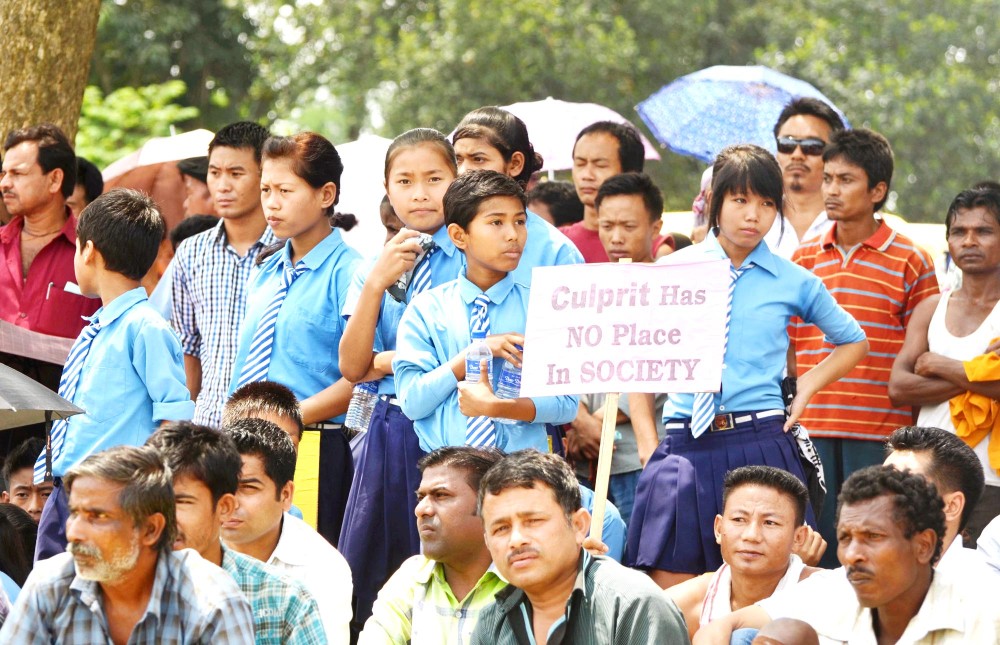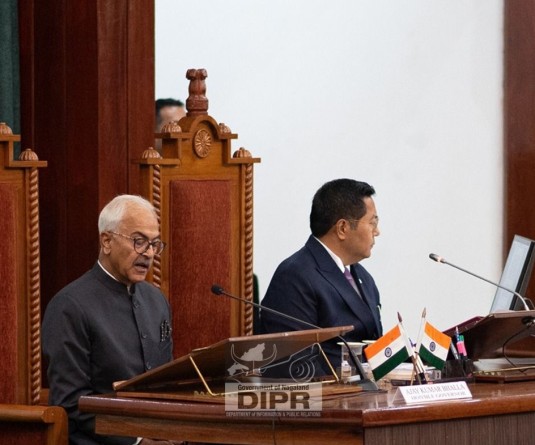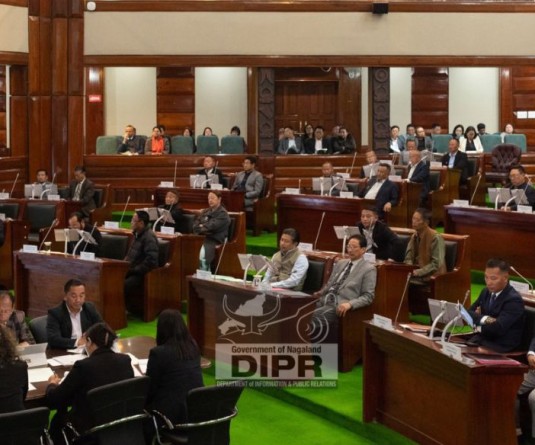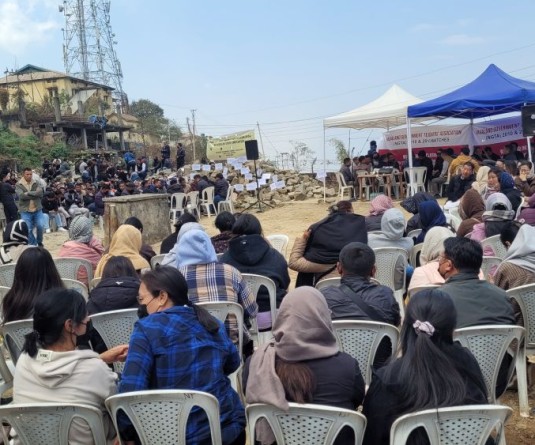School students and members of the public participate in a rally in protest against the May 16 triple homicide in Borlengri area in the outskirts of Dimapur under Karbi Anglong District of Assam, on Saturday. Photo by Caisii Mao

Triple homicide: Protest Rally outlines six-point charter of demands
DIMAPUR, MAY 25 (MExN): Amidst demand for awarding ‘severest of the severe punishment’ to the accused and the arrest of the absconding accomplice involved in the gruesome triple homicide of May 16, residents of Bor-Lengri, Choto Lengri, Lama Basti, Manipuri Basti, Longki Basti, Lengri Tea, Mohan Basti and Nahorjan Basti carried out a protest rally at Bor-Lengri public ground on Saturday, May 25. The rally culminated with the eight villages submitting a joint memorandum to the Deputy Commissioner, Karbi-Anglong, Assam.
It received overwhelming support from the Naga civil society as well as respected public figures from the said area. Dimapur Kyong Students’ Union, Naga Students’ Federation, Dimapur Kyong Eloe Hoho, Western Sumi Totimi Hoho, Dimapur Kyong Hoho, Naga Women Hoho Dimapur, Naga Council Dimapur, Kyong Hoho, Eastern Naga Peoples’ Organisation and Naga Hoho were the prominent Naga organisations, which were in attendance. LM Soba, Roland Killing and Rena Mokurjee, besides many others were in attendance from the Assam side extending support and solidarity to the event.
Ardent appeal for denying bail and awarding the “severest punishment” (amounting to no less than capital punishment) to the accused Thomas W. Humtsoe echoed in the rally today as each leader representing the many organisations were given the platform to speak. The accused had taken not three but five innocent lives, said one of the speakers. The two women, who were murdered that day, were said to be expectant mothers.
While strongly condemning the act of the perpetrators as “mindless, inhuman and barbaric,” the villages in the memorandum lauded the effort put in by the Assam Police and the Nagaland Police in nabbing the accused within a few days after the crime. Further, it expressed confidence that the police of the two neighbouring states will also capture the other accomplice, now absconding, at the earliest.
It also specifically outlined a six-point charter of demands. It included, “to nab the other co-accused without delay, not to release the accused on bail, to set up Fast Track Trial Court and award capital punishment to the accused, to grant ex-gratia compensation to the kin of the victims, to develop road infrastructure within the villages and, to intensify regular police patrol and setting up of Police beat house.”
The demand for better road linkage arose on the ground that it, more often than not, hampers police response to emergencies in the said villages and also resulting, the memorandum stated, in a “natural reluctance by the law enforcing agencies” to keep round-the-clock vigil in these areas. “We therefore appeal to your benign authority to make special effort towards improvement and maintenance of existing roads in the villages. Thereby not only the villages could move around without difficulties, but more so for the law enforcement agencies to make frisking easy so that we can be shielded from criminal activities in and around the villages,” it stated. The villages, which fall close to the inter-state border on the Assam side have for ages received a “step-motherly” treatment from the Assam government in terms of infrastructural development; black-topped roads a rarity.
Meanwhile, the organising Committee of the protest rally have extended its gratitude to all participants, donors, volunteers and organisations. “Indeed it is through your relentless support that had made the Rally a successful one,” stated a press release from the organising committee. It further noted the presence and support of the ENPO, NMA; Naga Council Dimapur, NSF, LSU, DNSU, NWHD, WSH, WSTH, DKH, DKEH, and other individuals, while extending gratitude to Parliamentary Secretary, Tovihoto Ayemi for sponsoring the rally and, M/s Jankilal Brothers and M/s Home Needs Lengrijan junction for providing drinking water.
Living under the roof of violence: Speak Up!
Classical pianist from Nagaland, Nise Meruno, asserts that “a movement” against violence helps. He suggests that it can start small through initiation by colony members or groups of friends. On the alarming rise of incidents of violence against women, he remarks, “I feel like a hypocrite when I whine, complain, do nothing and just take it as another news item. There are many women out there who are in pain but socially apt with a façade.” He also points out that the Naga man has never been able to accept a Naga woman as an equal being in the past and now the women folk (and some men) are crying out for their voices to be heard. “I believe they are heard but mostly by deaf ears.” He points out that neighbors or friends can be that glimmer of hope by not intruding but tactfully doing the needful, saying, “We are not the type to be calling helpline numbers, but rather cover our faces. Such things will always be there as long as we live in this world but we have to do whatever we can.”
Making a personal remark, he says, “If I have to look back I can only think of women more than men who have played their part well in molding my life. It’s absurd not treating women with respect. It’s a patriarchal culture and society that we live in but we can’t remain static with bygone traditions but be dynamic lest we face a bleak tomorrow.”
Longri Kichu, a Medical Doctor doing research in Public Health at JNU, thinks “Women in Nagaland seem to enjoy all the rights at one look but our society is deeply patriarchal with women having no representation in major decision-making bodies. I think it’s still the male who decides the size of the family. We still desire at least one male child in the family: this is dictated by our own old age customs and traditions (inheritance of land, properties etc). Longri pointed to a quote from an article in The Hindu, summing the issue perfectly, ‘’In Nagaland, you will find women running commercial establishments, teaching in university, campaigning against alcohol abuse and toiling on terraced farms. You will even spot them sporting hard hats and shoveling gravel next to a road-roller repairing roads. The only place where you won’t find a woman is the State Assembly.’’
Nancy I, Research Scholar, opines, “Our society is no more safe. Being a Naga woman who was always proud of our men being decent and safe to be around has changed. I feel ashamed and dejected.” She then adds sarcastically, “At this rate of crime, I feel we need divine intervention.”






